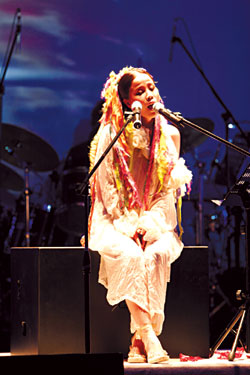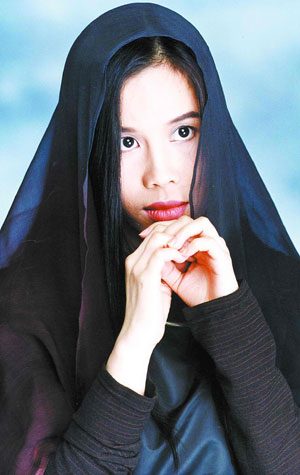Total eclipse of the heart
For those familiar with the Chinese music scene, the name Zhu Zheqin calls forth a picture of a Tibetan girl herding yaks and sheep high on the world's roof the Qinghai-Tibet Plateau. Eleven years after her landmark album Sister Drum's global release, Zhu, who adopted the Tibetan word Dadawa (moon) as her stage name, came back from a journey across South Asia and presented a different image in her latest album Seven Days. It was released in 2006, with a documentary, The Journey of Sound.
Above: Young singer-songwriter Dadawa becomes the first Chinese artist to be nominated for BBC Radio 3's Planet Award for World Music 2007. Right: Dadawa performs at her solo concert last year in Beijing, after the release of Seven Days, which she says is imbued with Oriental philosophy. File photos |
"It is an honor that goes beyond my expectations," she said. "Among Chinese music producers, world music is still non-mainstream. I feel happy to be recognized," said Dadawa during an e-mail interview with China Daily.
Talking about her latest album, she said it "combined oriental thoughts, philosophy and our lives".
Listeners fell for the whippet-thin singer who was born in Guangzhou of Guangdong Province, with her debut album Yellow Children in 1992. But it was a two-year journey in Tibet that established her career.
He Xuntian, a Shanghai music professor who had been collecting Tibetan music for 20 years, chanced upon Dadawa and they visited Tibet in 1995 for inspiration. They were deeply enchanted by Tibetan culture.
Her hit album Sister Drum established Dadawa as the most unique name in Chinese music. He, a distinctive music producer, explained that their trip to Tibet was more of a "rediscovery of themselves".
"The music in that album represents a whole new kind of Tibetan music, a music that is related to Tibet in a spiritual way."
Sister Drum amazes with a mix of Chinese melodies and vocals permeated with guitars, percussion, woodwinds and synthesizers. The album is the first international release by an artist from the Chinese mainland since the 1950s and has won plaudits worldwide.
plaudits worldwide.
"Dadawa's voice is so pure that it reminds people of what's most essential and natural in music," commented Britain's newspaper The Times.
In a decade, Dadawa and her mentor/producer He Xuntian recorded just Voices From The Sky (1998), after which she took a long break from recording.
But she has not been idle. She traveled from Kashmir to Delhi and Varanasi in India, to Nepal, then across the Himalayas and back to Tibet. Her documentary The Journey of Sound revolves around South Asian music, and includes street, gypsy and religious music.
"Ten years is a long time, but I don't want to produce music for the sake of the market. Music is my natural destiny," she said.
"Life, for me, can be recorded in the form of music. In my journeys, I have encountered different stories, which I re-tell through melody. It is mysterious and exciting."
The album is simply an expression of Dadawa's inner world. Chinese folk melodies have replaced the Tibetan theme, but the lush, ambient orchestration typical of He Xuntian's works still shines through.
"I realized her changes through the years which have come from her journey and experiences," said He as Dadawa held a solo concert last year in Beijing, dazzling audiences with her penetrating voice and exotic bare-feet dancing.
The album, as its name Seven Days suggests, is arranged as the days of the week. "People are very sentimental about life. They have different feelings over the seven days about life, the universe, love, or what they have gained and lost," said Dadawa, referring to the album as the result of years of listening and experimentation.
Through her travels through Europe, America, Africa and Asia, the singer has been thinking about her own origin. "My country is the real manifestation of the word 'multi-cultural'," she said.
Dadawa is direct in her opinion about the current Chinese music circles. She came home expecting new inspiring music, only to find herself "still one of a kind".
Music had become superficial and commercialized under strong media exposure. But the quality and content of music itself had not improved much, she said. "It is sad to see that a lot of music is empty and used as a way of moneymaking."
Dadawa has been well received in the West, appealing to fans of Asian and New Age music. She believes Western listeners only have a vague idea of Chinese music.
"Chinese music is zero for them, behind those of India and South Korea," she said.
For Dadawa, music is a bridge between souls. "When I perform on stage, I bring the listeners to imagine, to travel and to adventure."
She will cooperate with the London Symphony Orchestra in Canada in February and plans a solo concert in China.
"I don't want to predict anything in the future. I am just waiting quietly for the next miracle to happen," she said.
(China Daily 01/30/2007 page19)















